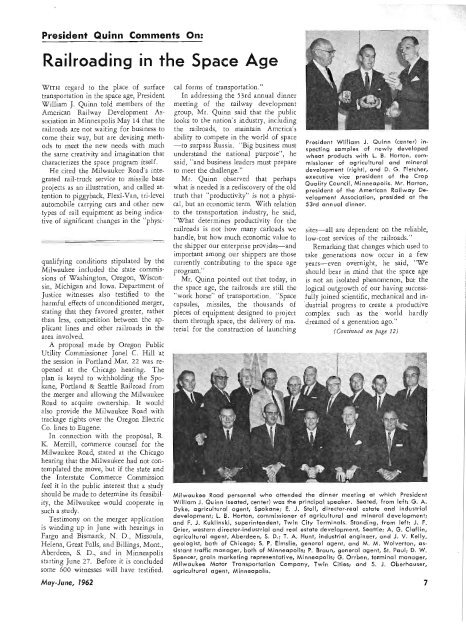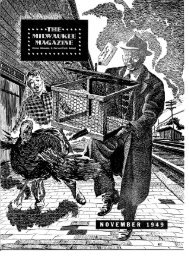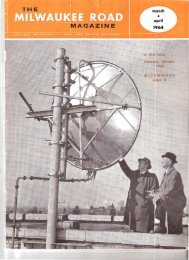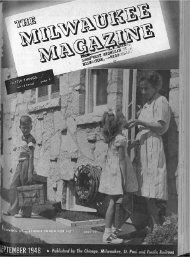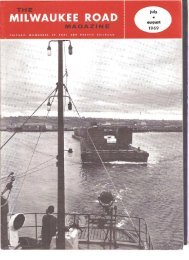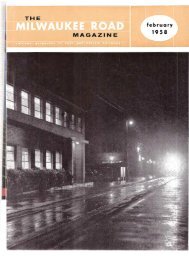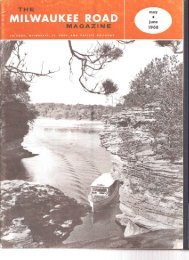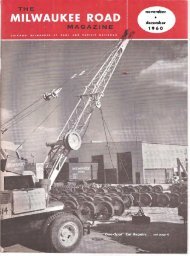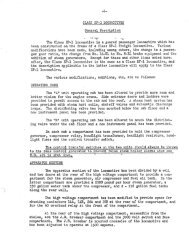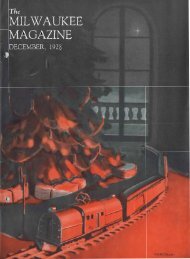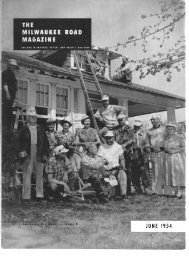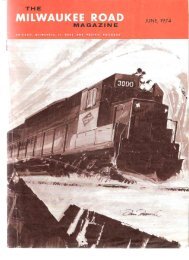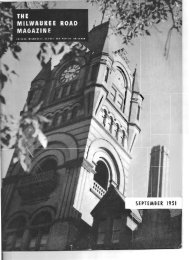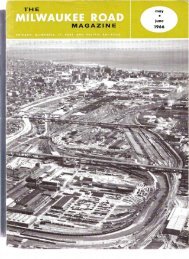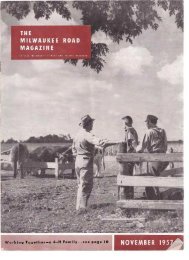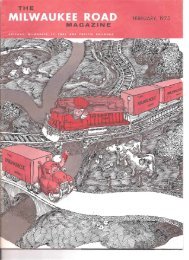May-June 1962 - Milwaukee Road Archive
May-June 1962 - Milwaukee Road Archive
May-June 1962 - Milwaukee Road Archive
Create successful ePaper yourself
Turn your PDF publications into a flip-book with our unique Google optimized e-Paper software.
President Quinn Comments On:<br />
Railroading In the Space Age<br />
WITH regard to the place of surface<br />
transportation in the space age, President<br />
William J. Quinn told members of the<br />
American Railway Development Association<br />
in Minneapolis <strong>May</strong> 14 that the<br />
railroads are not waiting for business to<br />
come their way, but are devising methods<br />
to meet the new needs with much<br />
the same creativity and imagination that<br />
characterizes the space program itself.<br />
He cited the <strong>Milwaukee</strong> <strong>Road</strong>'s integrated<br />
rail-truck service to missile base<br />
projects as an· illustration, and called attention<br />
to piggyback, Flexi-Van, tri-Ievel<br />
automobile carrying cars and other new<br />
types of rail equipment as being indicative<br />
of significant changes in the "physi<br />
qualifying conditions stipulated by the<br />
<strong>Milwaukee</strong> included the state commissions<br />
or Washington, Oregon, Wisconsin,<br />
Michigan and Iowa. Department of<br />
Justice witnesses also testified to the<br />
harmful effects of unconditioned merger,<br />
stating that they favored greater, rather<br />
than less, competition between the applicant<br />
lines and other railroads in the<br />
area involved,<br />
A proposal made by Oregon Public<br />
Utility Commissioner Jonel C. Hill at<br />
the session in Portland Mar. 22 was reopened<br />
at the Chicago hearing. The<br />
plan is keyed to withholding the Spokane,<br />
Portland & Seattle Railroad from<br />
the merger and allowing the <strong>Milwaukee</strong><br />
<strong>Road</strong> to acquire ownership. It would<br />
also provide the <strong>Milwaukee</strong> <strong>Road</strong> with<br />
trackage rights over the Oregon Electric<br />
Co. lines to Eugene.<br />
In connection with the proposal, R.<br />
K. Merrill, commerce counsel for the<br />
<strong>Milwaukee</strong> <strong>Road</strong>, stated at the Chicago<br />
hearing that the <strong>Milwaukee</strong> had not contemplated<br />
the move, but if the state and<br />
the Interstate Commerce Commission<br />
feel it in the public interest that a study<br />
should be made to determine its feasibility,<br />
the <strong>Milwaukee</strong> would cooperate in<br />
such a study.<br />
Testimony on the merger application<br />
is winding up in <strong>June</strong> with hearings in<br />
Fargo and Bismarck, N. D., Missoula,<br />
Helena, Great FaUs, and Billings, Mont.,<br />
Aberdeen, S. D., and in Minneapolis<br />
starting <strong>June</strong> 27. Before it is concluded<br />
some 600 witnesses will have testified.<br />
<strong>May</strong>-<strong>June</strong>, 7962<br />
cal forms of transportation."<br />
In addressing the 53rd annual dinner<br />
meeting of the railway development<br />
group, Mr. Quinn said that the public<br />
looks to the nation's industry, including<br />
the railroads, to maintain America's<br />
ability to compete in the world of space<br />
-to surpass Russia. "Big business must<br />
understand the national purpose", he<br />
said, "and business leaders must prepare<br />
to meet the challenge."<br />
Mr. Quinn observed that perhaps<br />
what is needed is a rediscovery of the old<br />
truth that "productivity" is not a physical,<br />
but an economic term. With relation<br />
to the transportation industry, he said,<br />
"What determines productivity for the<br />
railroads is not how many carloads we<br />
handle, but how much economic value to<br />
the shipper our enterprise provides-and<br />
important among our shippers are those<br />
currently contributing to the space age<br />
program."<br />
Mr. Quinn pointed out that today, in<br />
the space age, the railroads are still the<br />
"work horse" of transportation. "Space<br />
capsules, missiles, the thousands of<br />
pieces of equipment designed to project<br />
them through space, the delivery of material<br />
for the construction of launching<br />
President William J. Quinn (center) inspecting<br />
samples of newly developed<br />
wheat products with L. B. Horton, commissioner<br />
of agricultural and mineral<br />
development (right), and D. G. Fletcher,<br />
executive vice president of the Crop<br />
Quality Council, Minneapolis. Mr. Horton,<br />
president of the American Railway Development<br />
Association, presided at the<br />
53rd annual dinner.<br />
sites-all are dependent on the reliable,<br />
low-cost services of the railroads."<br />
Remarking that changes which used to<br />
take generations now occur in a few<br />
years-even overnight, he said, "We<br />
should bear in mind that the space age<br />
is not an isolated phenomenon, but the<br />
logical outgrowth of our having successfully<br />
joined scientific, mechanical and in<br />
'dustrial progress to create a productive<br />
complex such as the world hardly<br />
dreamed of a generation ago."<br />
(Continued on page 12)<br />
<strong>Milwaukee</strong> <strong>Road</strong> personnel who attended the dinner meeting at which President<br />
William J. Quinn (seated, center) was the principal speaker. Seated, from left: G. A.<br />
Dyke, agricultural agent, Spokane; E. J. Stoll, director-real estate and industrial<br />
development; L. B. Horton, commissioner of agricultural and mineral development;<br />
and F. J. Kuklinski, superintendent, Twin City Terminals. Standing, from left: J. F.<br />
Grier, western director-industrial and real estate development, Seattle; A. G. Claflin,<br />
agricultural agent, Aberdeen, S. D.; T. A. Hunt, industrial engineer, and J. V. Kelly,<br />
geologist, both of Chicago; S. P. Elms(ie, general agent, and M. M. Wolverton, assistant<br />
traffic manager, both of Minneapolis; P. Braun, general agent, St. Paul; D..W.<br />
Spencer, grain marketing representative, Minneapolis; G. Orrben, tNminal manager,<br />
<strong>Milwaukee</strong> Motor Transportation Company, Twin Cities; and S. J. Oberhauser,<br />
agricultural agent, Minneapolis.<br />
7


